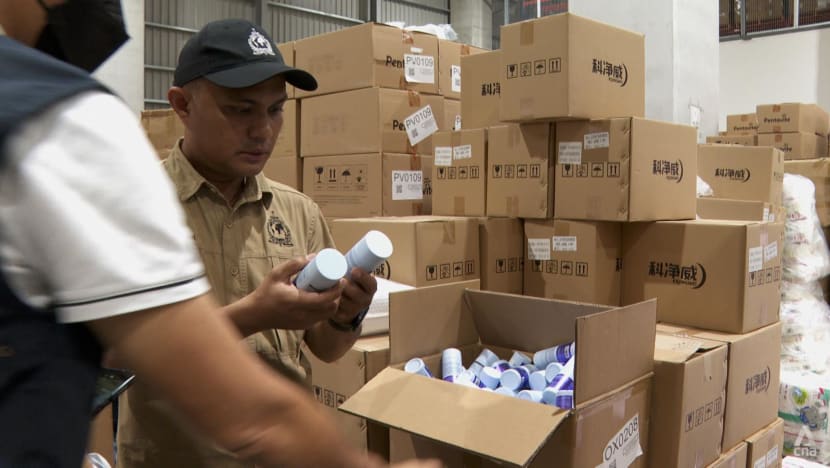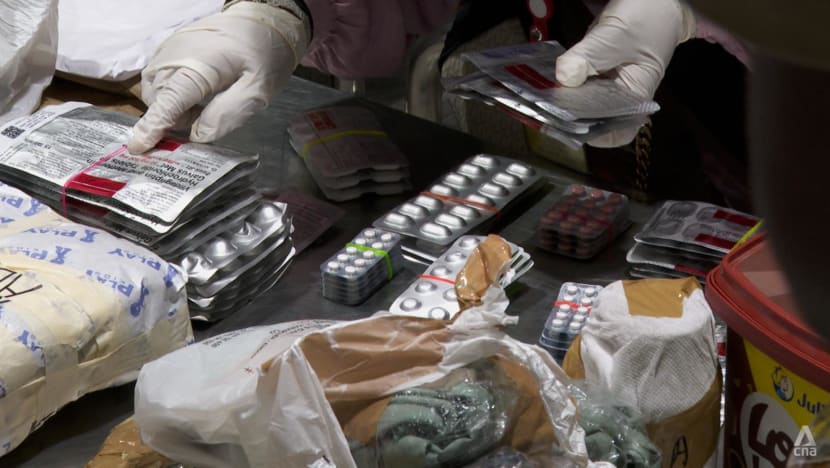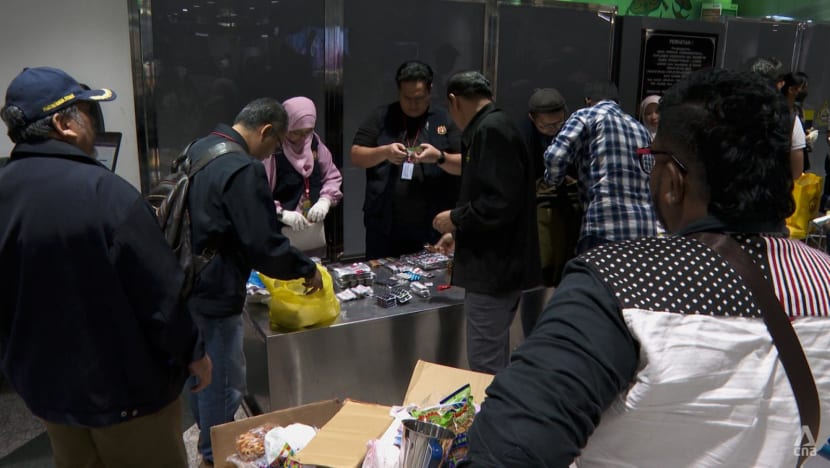Malaysia seizes US$1.6m in illegal health products during global Interpol crackdown
CNA was granted exclusive access to the raids in Malaysia.

Malaysian authorities have seized more than RM7 million (US$1.6 million) worth of health products, as part of a global blitz targeting the online sale of illicit pharmaceuticals.

This audio is generated by an AI tool.
KUALA LUMPUR: Malaysian authorities have seized more than RM7 million (US$1.6 million) worth of illegal health products, as part of a global blitz targeting the online sale of illicit pharmaceuticals.
These range from prescription drugs and over-the-counter supplements to traditional remedies.
The sweep was part of Operation Pangea, an annual global bust coordinated by international police organisation Interpol.
This time, a six-month effort across 90 countries resulted in the seizure of 50.4 million doses of illicit pharmaceuticals worth US$65 million, highlighting the alarming scale of the global trade in unapproved and counterfeit medicines, said Interpol on Thursday (Jun 26).

Interpol’s acting assistant director of criminal networks Alfonso Meijuto Rodriguez told CNA that the duration of this year’s operation was extended to six months in order to gain a better understanding of the issue.
“In previous editions of Operation Pangea, which lasted over a week, we noticed that much more data and information needed to be collected for a deeper knowledge of the phenomena," he added. "So we decided to amplify the timeline.”
Nervous system agents, including psychostimulants, anti-anxiety drugs, and medications for Parkinson’s disease, topped the list as the most seized product type.
Operation Pangea also saw the arrest of 769 suspects and the dismantling of 123 criminal groups worldwide.
Interpol said that the seizures and arrests are the largest in the operation’s 17-year history.
In total, law enforcement agencies launched 1,728 investigations and issued 847 search warrants, it added.
TIP-OFFS AND TAKEDOWNS
Malaysian authorities said its enforcement action was prompted by public tip-offs submitted online.
Mohd Zawawi Abdullah, director of the pharmacy enforcement division at Malaysia’s Ministry of Health, said its public complaints management system allows people to report suspicious products or sales.
“Once we verified this complaint, our team moved in to carry out enforcement actions,” he said.
Tens of thousands of boxes filled with illicit medicine were discovered by authorities in a raid across the Klang Valley region surrounding Kuala Lumpur.
The sting targeted warehouses believed to be distribution hubs for the online trade of illegal pharmaceuticals. It also covered shophouses, and residential units where pharmaceuticals were being stored and repackaged illegally.
Officers from the health ministry led the charge, alongside local authorities and Interpol.
As part of the operation, authorities also intercepted travellers arriving at Kuala Lumpur International Airport with large quantities of unregistered medicine that far exceeded the amounts permitted under their prescriptions or visa durations.
Hidden among personal items, the drugs were believed to be part of a wider network of imports disguised as personal use, but intended for sale.

ONLINE TRADE
Operation Pangea also saw the shutdown of approximately 13,000 criminal-linked websites, social media pages, channels, and bots used to market and sell illegal or falsified medicines.
Interpol commended the efforts of various national authorities in monitoring and taking down the online listings.
“Malaysia and Singapore have been very active participants in this operation for years, with the steady shutdown of listings as an important component in the fight against pharmaceutical trafficking,” said Meijuto Rodriguez.
Malaysia was responsible for 7,000 of the takedowns, the highest number recorded by any country. This was followed by Russia, Ireland, Singapore and Iran.
The five countries collectively accounted for 96 per cent of all listings taken down.
“Unlike physical stores, online sellers can disappear or change the platform overnight, which makes our enforcement more complicated,” said Zawawi.
“Many people don't realise the risk of unregistered products and are easily misled by flashy advertisements or social media influencers.”
The trade in counterfeit medicine is not just a crime but a threat to public health linked to more than a million deaths each year, according to the World Health Organization.

















